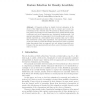Free Online Productivity Tools
i2Speak
i2Symbol
i2OCR
iTex2Img
iWeb2Print
iWeb2Shot
i2Type
iPdf2Split
iPdf2Merge
i2Bopomofo
i2Arabic
i2Style
i2Image
i2PDF
iLatex2Rtf
Sci2ools
101
click to vote
PKDD
2009
Springer
2009
Springer
Feature Selection for Density Level-Sets
A frequent problem in density level-set estimation is the choice of the right features that give rise to compact and concise representations of the observed data. We present an efficient feature selection method for density level-set estimation where optimal kernel mixing coefficients and model parameters are determined simultaneously. Our approach generalizes one-class support vector machines and can be equivalently expressed as a semi-infinite linear program that can be solved with interleaved cutting plane algorithms. The experimental evaluation of the new method on network intrusion detection and object recognition tasks demonstrate that our approach not only attains competitive performance but also spares practitioners from a priori decisions on feature sets to be used.
Data Mining | Density Level-set Estimation | Feature Selection Method | Kernel Mixing Coefficients | PKDD 2009 |
Related Content
| Added | 27 May 2010 |
| Updated | 27 May 2010 |
| Type | Conference |
| Year | 2009 |
| Where | PKDD |
| Authors | Marius Kloft, Shinichi Nakajima, Ulf Brefeld |
Comments (0)

